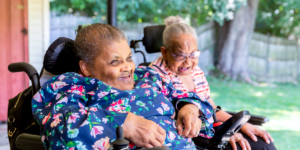As a first-time parent or one welcoming a new baby into their home, every parent wants the best for their child, whether it's buying the best interactive toys or only listening to Ms. Rachel, a parent will do anything to protect their child and raise them to be the best they can be.
However, many parents don’t realize that 1 in 36 children are diagnosed with autism spectrum disorder (ASD) in the United States, according to the Centers for Disease. So, how do you know if your child has autism?
Here are five signs and symptoms children show during early development:
Not reaching social communication and interaction milestones by certain ages.
For example, they avoid or don’t hold eye contact, don't respond to their name by nine months of age, don't show facial expressions by nine months, don't show or mimic gestures by 12 months, don’t share interests with others by 15 months, or don't join other children in play by 36 months of age.
Shows restricted or repetitive behaviors or interests.
Including lining up toys or other objects and getting upset when the order is changed, repeating words or phrases, playing with toys the same way every time, and focusing on certain parts of the toys like the wheels, flaps, hands, rocks, body, or spins in circles; or has an unusual reaction to the way things sound, smell, taste, look or feel.
Delays in social interaction and play.
Children with autism have difficulty making or sustaining friendships with other children and tend not to join them in play by 36 months. They typically don’t engage in pretend or role play by 48 months and don’t demonstrate freedom, like singing or dancing, for their parents or caregivers by 60 months.
Display a lack of empathy toward others.
Children with autism can tend to display a lack of empathy towards their peers by not noticing when others are hurt or upset by 24 months or have difficulty interpreting what others think or feel based on their facial expressions. As a result, children with autism tend to be less likely to show empathy or concern toward others.
Process their emotions in different ways.
According to Health Grades, for those with autism, many children can process their emotions in different ways, including exuding fearlessness or having immense fear, anxiety, or excessive worry. Some children will feel high stress when in an uncomfortable situation or not cry in pain or fear.
According to the National Institute of Health, most children are not diagnosed with autism until after age 3, even though most healthcare providers can see developmental delays at earlier ages. However, research has shown that early detection and intervention services improve a child’s outcome.
At KenCrest, our Birth-to-Five Early Intervention Services support the child and the parent through a specialized coaching model that identifies specific concerns and helps develop strategies to enhance the child’s development.
*All data cited are sourced from the CDC, National Institute of Health, and Health Grades.











